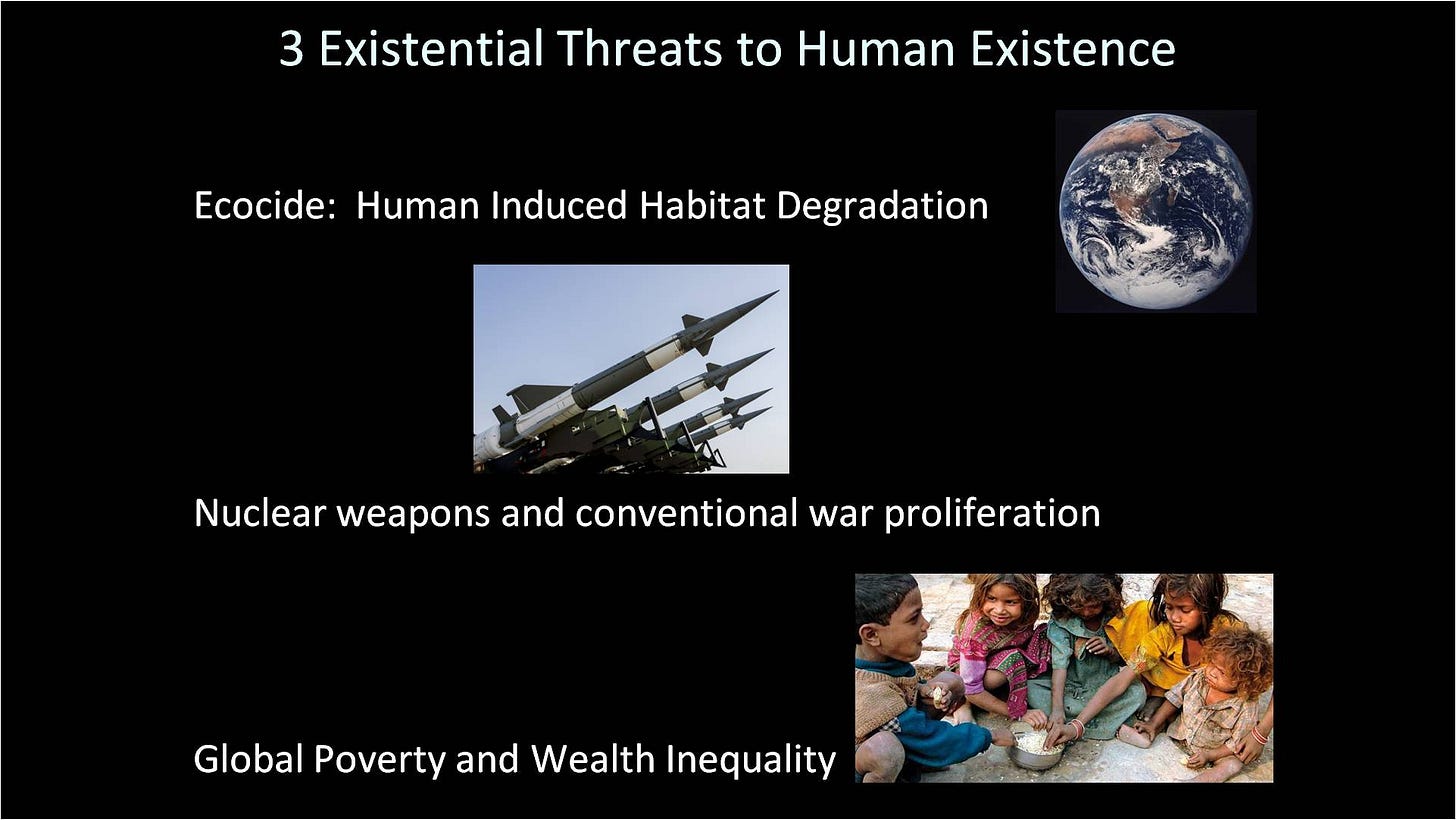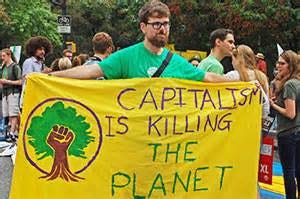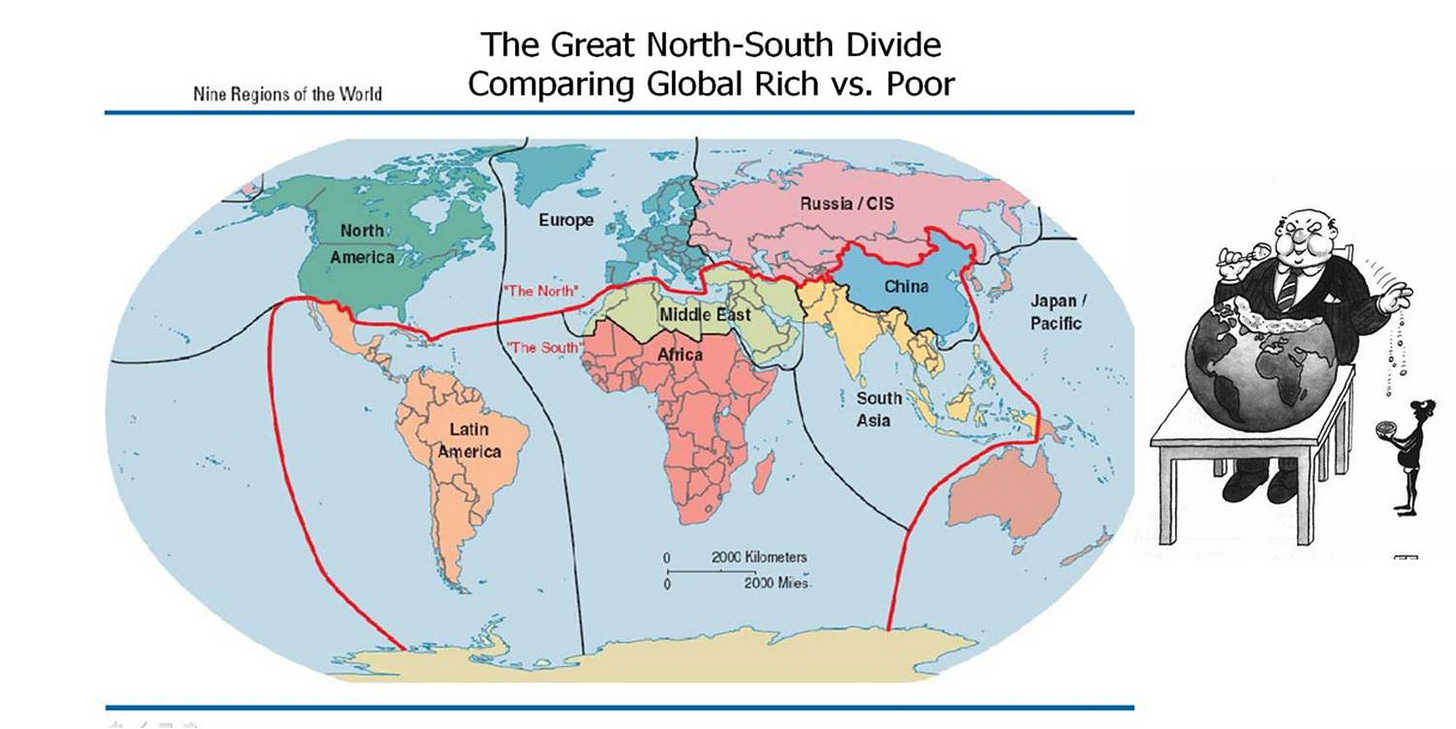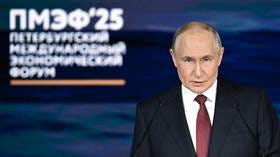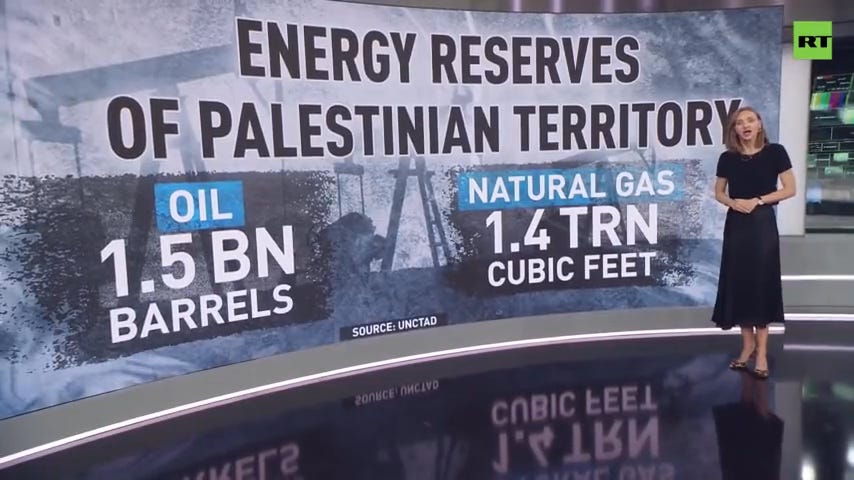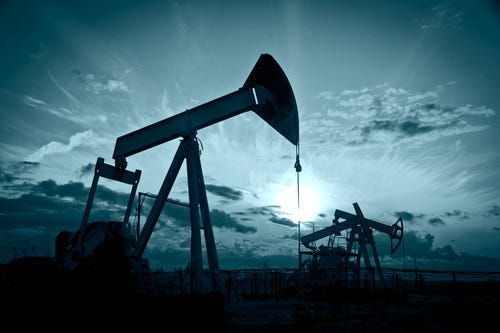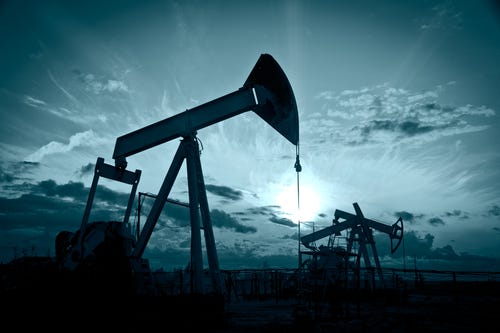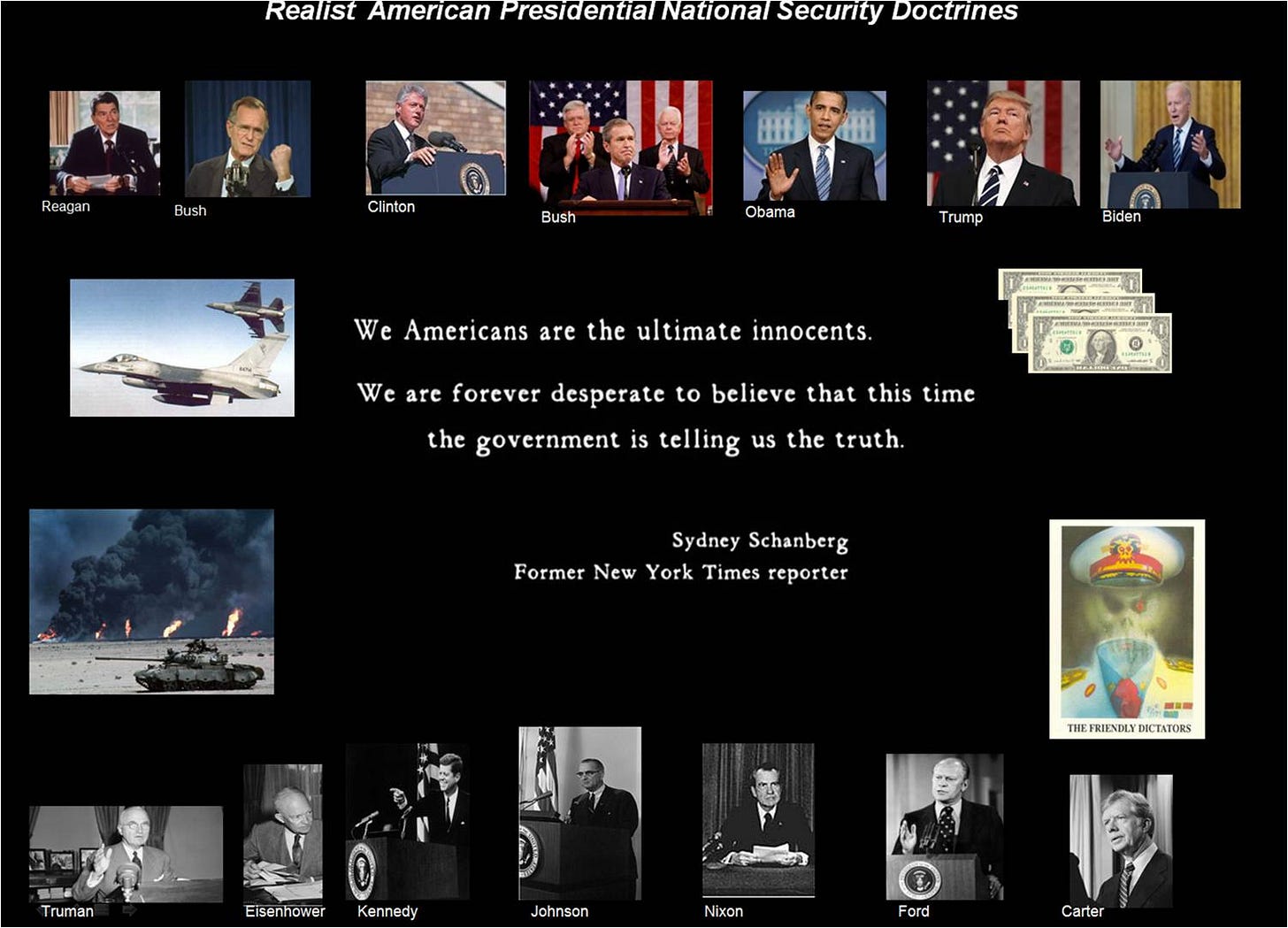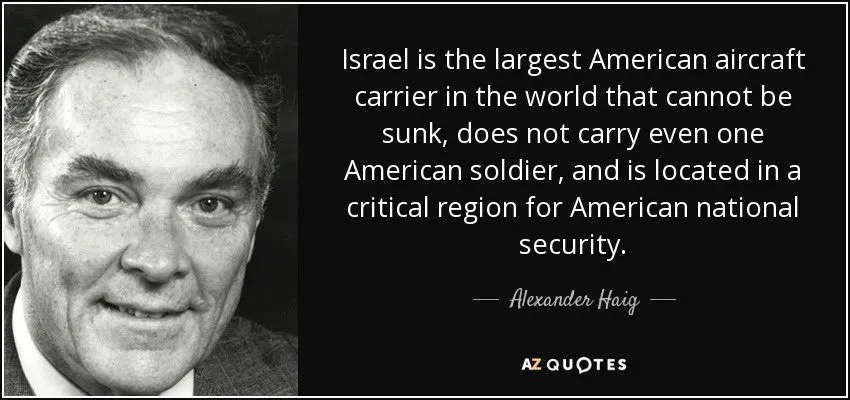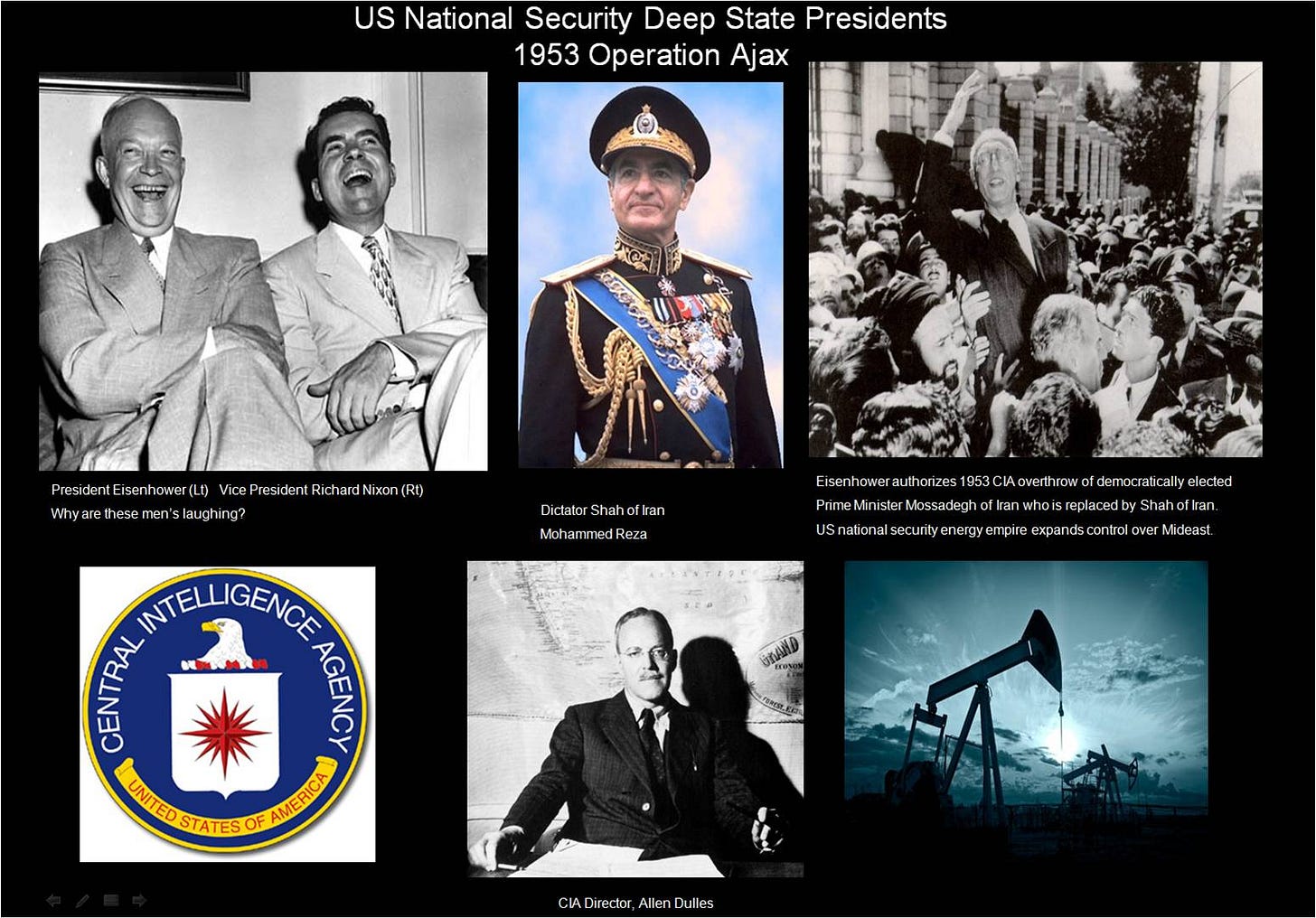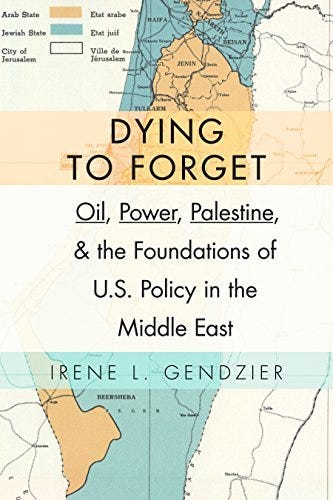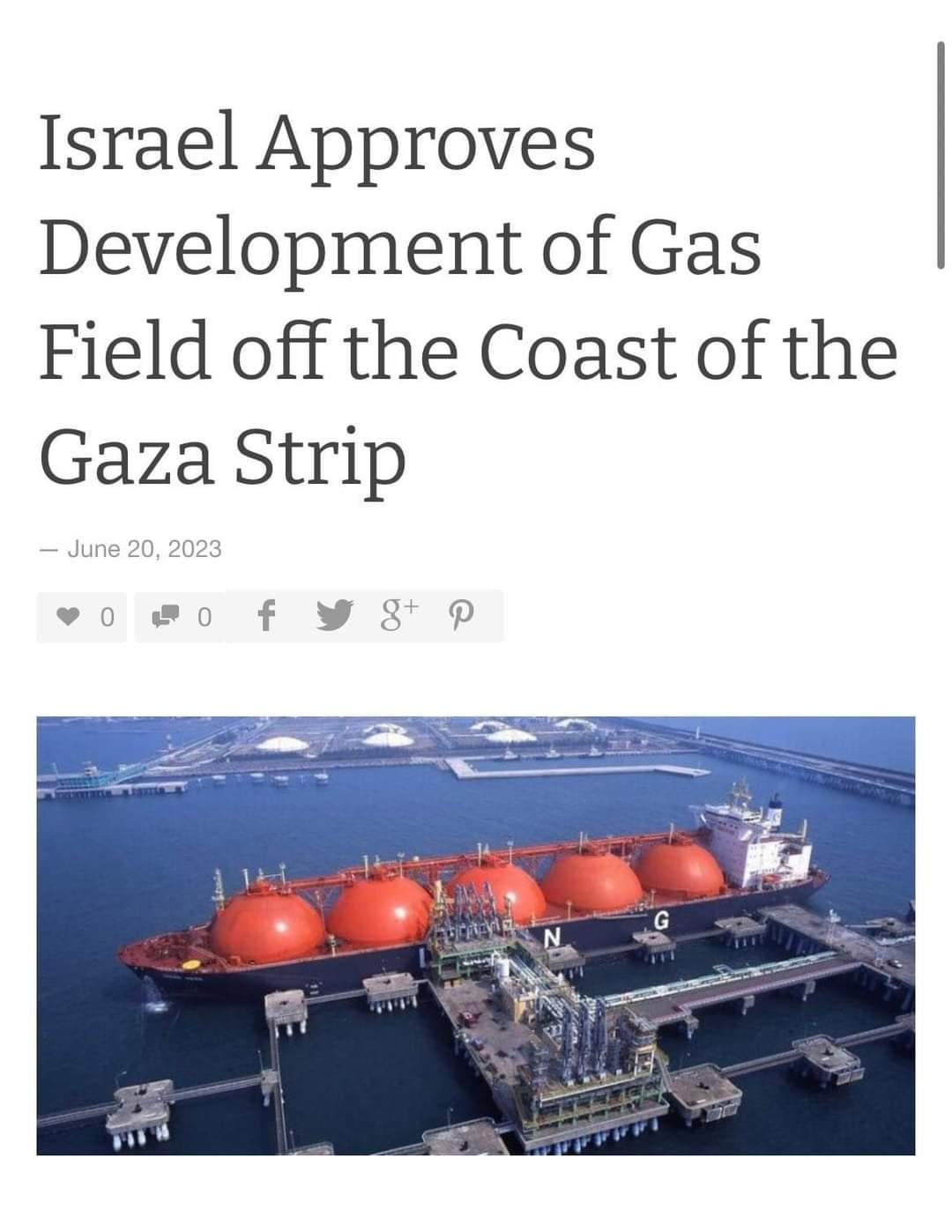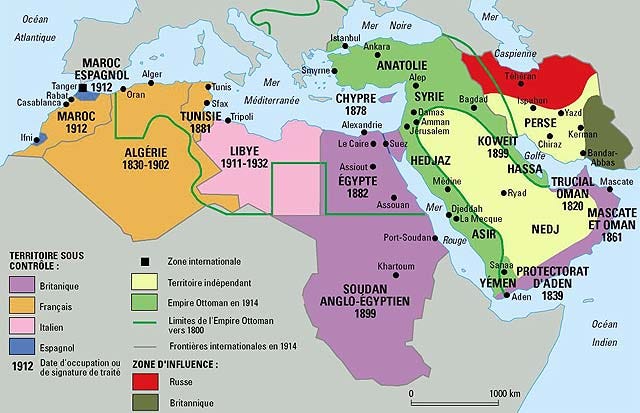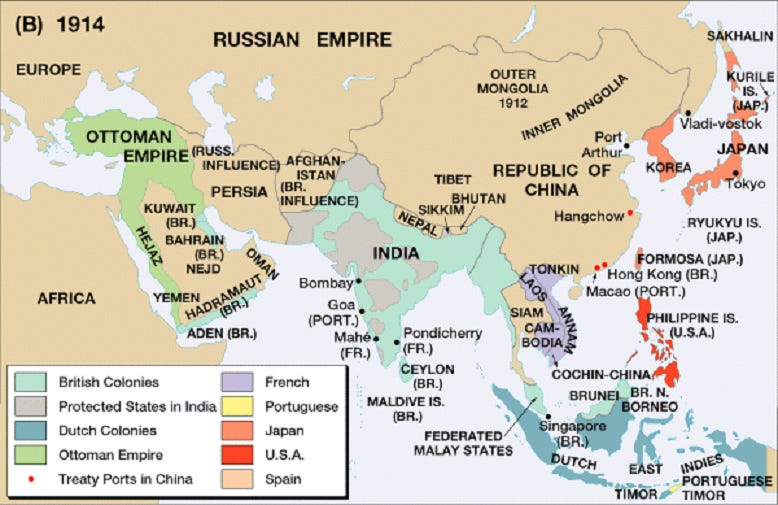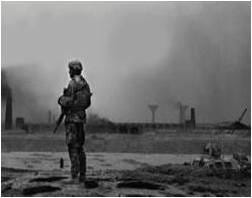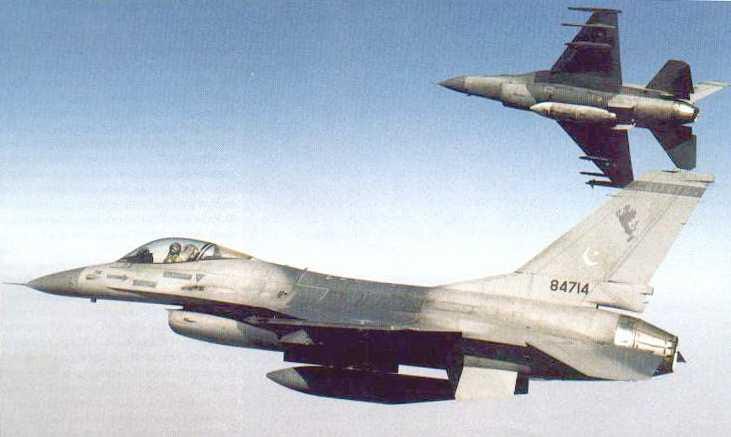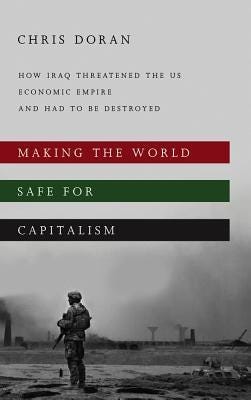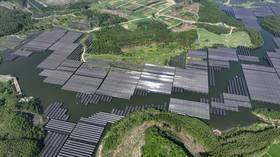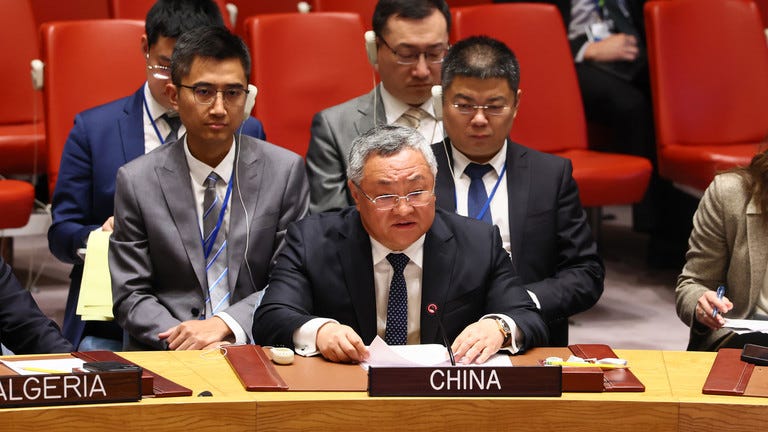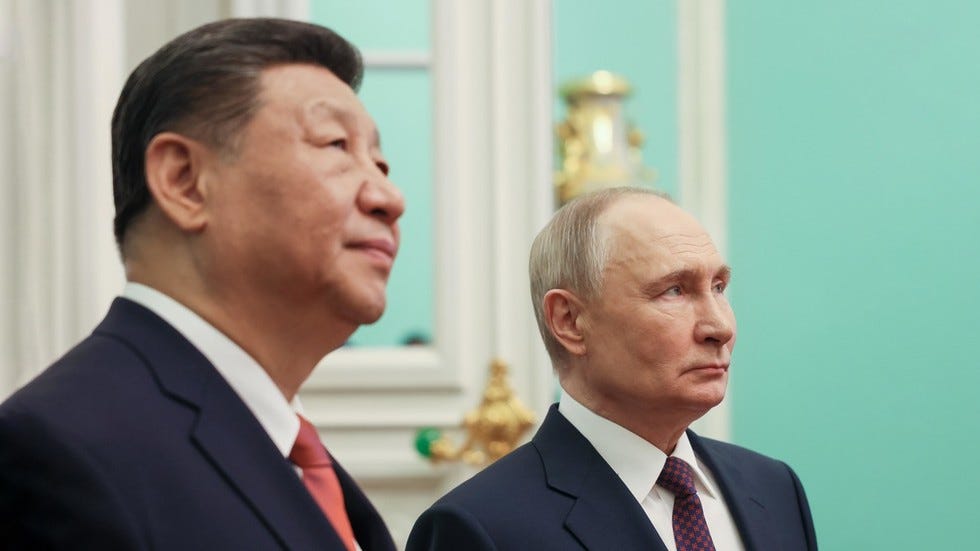Russia takes on the West’s biggest obsession
Putin says the world needs a new growth model. He might be right.
Brief Report on the State of the Planet
Existential Threats to Humanity in Our Shared Habitat on a Very Lonely Planet:
Existential Threat to Humanity #1: Ecocide: Global Human Habitat Destruction
Existential Threat to Humanity #2: Global Poverty and Wealth Inequality
The Great North - South Political Economic Divide
26 Jun, 2025 15:58 Russia Today
World’s richest 1% could end poverty 22 times – Oxfam
The world’s wealthiest have seen their fortunes increase by $33.9 trillion over the past decade, according to the anti-poverty charity
The richest 1% of the people on Earth have gained over $33.9 trillion in real terms since 2015, according to a new report by UK-based anti-poverty group Oxfam.
The amount is enough to end extreme poverty 22 times over, based on the World Bank's highest income threshold of $8.30 per person per day.
Approximately 3,000 billionaires worldwide have collectively increased their wealth by $6.5 trillion over the past decade, bringing their total net worth to 14.6% of global GDP, the report claims.
Oxfam argues that while personal wealth has skyrocketed, efforts to reduce poverty have significantly stalled.
According to the report, wealthy nations are making the steepest cuts to life-saving development assistance since 1960.
Oxfam projects that G7 countries, responsible for approximately 75% of all official aid, will reduce their contributions by 28% in 2026 compared to 2024. The UK alone is expected to decrease its spending on aid by 40% by 2027
The report also highlights the growing gap between private and public wealth. From 1995 to 2023, global private wealth soared by $342 trillion, while public wealth in the same period rose by only $44 trillion.
Over half of the world’s poorest countries are now on the brink of a debt crisis, the report warns. Many are being forced to spend more on servicing debt than on healthcare or education.
The report singles out private creditors, who hold over half of the external debt of low-income countries, for refusing to restructure loans and imposing punitive repayment terms.
According to a global public opinion survey cited by Oxfam, 90% of respondents support taxing the super-rich to fund public services and climate action.
Existential Threat to Humanity #3: Global Nuclear and Conventional Wars and Conflicts
Ecological degradation. is at the forefront of current news reports which tell us that it has accelerated within the last 200 years of modern industrialized civilization and even quicker within the last 50 years under the policies of 'GLOBALIZATION' and NEOLIBERALISM that support and spread corporate capitalist markets penetrating the Global South. In order to summarize many of these issues, below, you will find a brief report on the state of the planet that lists examples of some of the major critical problems facing humanity and our shared habitat.
The consequences of massive potential ecocide or 'killing of the habitat' is not only a biological scientific fact as evidenced by human induced global warming, extinction events of species, and extreme weather events but also an historical, economic, social and political science problem.
Why? Because our POLITICS have not kept pace with an ever-expanding modern industrialized capitalist site. Culture of mass production, consumption and massive waste to sustain large scale CONSUMERISM. by a globalized PROFIT driven MARKET system.
This MARKET system has far outstripped our outdated political economic institutions, especially, as many have argued, that the global capitalist system has come to dominate all major public policy formulations called NEOLIBERALISM where public POWER has been displaced by private corporate POWER based on the IDEOLOGY of CAPITALISM
Related recommended study:
In the wake of the global financial crisis, and ongoing savage government cuts across the world, Garry Leech addresses a pressing and necessary the nature of contemporary capitalism, and how it inherently generates inequality and structural violence.
Drawing on a number of fascinating case studies from across the world - including the forced displacement of farmers in Mexico, farmer suicides in India, and deaths from preventable and treatable diseases in Sub-Saharan Africa, as well as the unsustainable exploitation of the planet's natural resources - Leech provocatively argues that global capitalism constitutes a form of genocide against the poor, particularly in the global South.
Essential and eye-opening book questions the legitimacy of a system that inevitably results in such large-scale human suffering, while going beyond mere critique to offer a more egalitarian, democratic and sustainable global alternative.
The Myth of "Green Capitalism"
Green Capitalism or 'Which Kind of Green do We Mean?'
Related news to accompany posted news report
25 Jun, 2025 17:09 Russia Today
Russia takes on the West’s biggest obsession
Russian President Vladimir Putin speaks during a plenary session of the St. Petersburg International Economic Forum in St. Petersburg, Russia. © Sputnik / Sergey Bobylev
When Russian President Vladimir Putin told the St. Petersburg International Economic Forum last week that the world needs “a new model of global growth,” many Western commentators heard only a familiar plea: lift the sanctions, drop the tariffs, stop using trade as a geopolitical cudgel.
Important as those points are, they miss the larger ambition. Even if every punitive measure vanished tomorrow, the world economy would simply roll back to its early-2000s setting – fresh paint on an old engine. Putin’s challenge cuts deeper: capitalism’s traditional “produce more, consume more” logic has hit its planetary and social limits, and Moscow is calling time on the illusion that endless expansion can continue unopposed.
Why the old formula is exhausted
Since the first steam engines hissed into life in the 18th century, national success has been measured by rising GDP and swelling personal consumption. That linear model delivered astonishing gains –but it never cracked the problem of inequality. The gap between North and South stubbornly yawns; within many countries, the gulf between penthouse and pavement only widens. The promise that “a rising tide lifts all boats” rings hollow for the majority still paddling in the shallows.
Even starker are the material constraints. The capitalist appetite is infinite; the planet’s resources are not. If the next three billion people push their consumption up to Western middle-class levels, our biosphere simply will not cope. Climate stress, ecological degradation and resource scarcity are already obvious. They will only intensify.
Toward ‘reasonable sufficiency’
Putin’s “leap into the future” therefore means more than de-weaponizing trade. It means replacing quantity-obsessed growth with what he called rationalization of consumption and production – a shift from bigger to better, from accumulation to sustainability.
This is not a call for universal sackcloth or forced equalization. Eradicating poverty, ensuring food and energy security, and meeting basic human needs remain non-negotiable. But raw GDP will decline as a yardstick. A state’s success will increasingly be judged by life expectancy, educational quality, environmental health, cultural vibrancy, scientific breakthroughs, social cohesion and the absence of corrosive political divides.
That list is hardly utopian. Many governments already compile “well-being indices” alongside budget spreadsheets. What Russia is urging is a coordinated effort – within BRICS, the SCO, the Eurasian Economic Union and beyond – to turn those indicators into shared development targets.
Technology as midwife
Sceptics ask how any economy can thrive without relentless material churn. The answer lies, partly, in the very technologies now unsettling labor markets. Artificial intelligence, advanced robotics, sixth-generation mobile networks and other breakthroughs are stripping out drudgery. They free people to pursue creative, scientific, and community-building roles – activities that enrich societies without battering the biosphere.
The new growth model, in short, prizes human potential over disposable products. It values the software of civilization more than the hardware of mass consumption. That change will not come overnight, nor without friction. But the alternative is to race ever faster toward ecological overshoot and social fracture.
Evolution – or revolution?
Transitions of this scale can be smooth or cataclysmic. The best chance of an orderly shift is deliberate, multilateral coordination:
• Trade that respects limits. Countries must keep markets open while discouraging wasteful, environmentally destructive patterns of demand and supply.
• Shared modernization road-maps. National development plans – Russia’s, China’s, India’s, Brazil’s – should align where possible, exchanging technology and policy know-how to accelerate sustainable goals.
• Cultural cross-pollination. A “new Comintern,” as State Duma Speaker Vyacheslav Volodin once quipped, need not advance ideology but could champion anti-colonial, post-Western cultural dialogue – film, literature, research, education – that diversifies global narratives.
BRICS, the SCO and the EAEU already possess the demographic and economic heft to pilot such experiments. They represent most of the world’s population, a majority of global growth, and regions where consumption is still rising fastest. If these blocs can demonstrate that higher living standards need not equal higher emissions or deeper inequality, the model will sell itself.
Will the West listen?
Critics in Washington, London, and Brussels dismiss Moscow’s pitch as cover for its own geopolitical battles. Yet the underlying logic – finite resources, intolerable inequality, technological disruption – matches concerns voiced daily in Davos, at UN climate summits, and in IMF working papers. The difference is that Russia frames the problem as systemic, not managerial. Tinkering with carbon taxes or supply-chain “friend-shoring” is cosmetic if the growth engine itself demands perpetual overdrive.
A post-GDP world
From St. Petersburg, Putin’s message was blunt: chasing an ever-rising output curve is obsolete. The 21st century will belong to states that balance reasonable sufficiency with genuine human flourishing – and that resist the temptation to weaponize economics when domestic politics falter.
Building that world will test every government’s ingenuity. But the alternative is a planet where growth’s winners barricade themselves against a majority left behind and a climate tipping toward instability.
Russia says a different path is possible. The question is whether the rest of the world is ready to step onto it – or whether we will keep sprinting along a road we know ends at a cliff.
This article was first published by Izvestia newspaper, and was translated and edited by the RT team.
Related news:
MAGA Zionist Trump's Illegal War against Iran a Big Fat Flop
Trump compares Iran strike to Hiroshima
Money Talks, Bullshit Walks!!! Greasing The Skids: Who’s the “Real Terrorists”???
A plan looking for a pretext.
Trump urges petroleum producers to ‘keep oil prices down'
23 Jun, 2025 18:15 Russia Today Trump urges petroleum producers to ‘keep oil prices down’
Why Endless Wars for Empire?
From the Vietnam Wars to the Mideast Wars
Why is it difficult for Americans to Learn that War is a Racket?
America, Oil, and War in the Middle East
President Reagan’s national security advisor, General Haig for once telling the truth about why Zionist Israel is America’s Mideast proxy regime.
Let our position be absolutely clear: An attempt by any outside force to gain control of the Persian Gulf region will be regarded as an assault on the vital interests of the United States of America, and such an assault will be repelled by any means necessary, including military force.
“Great empires are not maintained by timidity.”
― Tacitus
“Veni, vidi, vici. (I came, I saw, I conquered.)”
― Julius Caesar
Past is Prologue: Trump - Netanyahu Doctrine & US Empire of Chaos
Past is Prologue: From Eisenhower’s 1953 “Operation Ajax” to MAGA Deep State Trump/Bibi’s 2025 “Operation Rising Lion”
Overthrow: America’s Century of Regime Change from Hawaii to Iraq | Democracy Now!
How to Overthrow a Government Pt. 1: The 1953 U.S. Coup in Iran | Democracy Now!
Part II…Overthrow: America’s Century of Regime Change from Hawaii to Iraq | Democracy Now!
Dying to Forget: Oil, Power, Palestine, and the Foundations of U.S. Policy in the Middle East
Irene L. Gendzier presents incontrovertible evidence that oil politics played a significant role in the founding of Israel, the policy then adopted by the United States toward Palestinians, and subsequent U.S. involvement in the region. Consulting declassified U.S. government sources, as well as papers in the H.S. Truman Library, she uncovers little-known features of U.S. involvement in the region, including significant exchanges in the winter and spring of 1948 between the director of the Oil and Gas Division of the Interior Department and the representative of the Jewish Agency in the United States, months before Israel's independence and recognition by President Truman.
Gendzier also shows that U.S. consuls and representatives abroad informed State Department officials, including the Secretary of State and the President, of the deleterious consequences of partition in Palestine. Yet the attempt to reconsider partition and replace it with a UN trusteeship for Palestine failed, jettisoned by Israel's declaration of independence. The results altered the regional balance of power and Washington's calculations of policy toward the new state. Prior to that, Gendzier reveals the U.S. endorsed the repatriation of Palestinian refugees in accord with UNGA Res 194 of Dec. 11, 1948, in addition to the resolution of territorial claims, the definition of boundaries, and the internationalization of Jerusalem. But U.S. interests in the Middle East, notably the protection of American oil interests, led U.S. officials to rethink Israel's military potential as a strategic ally. Washington then deferred to Israel with respect to the repatriation of Palestinian refugees, the question of boundaries, and the fate of Jerusalem—issues that U.S. officials have come to realize are central to the 1948 conflict and its aftermath.
About the Author and Scholar
Irene L. Gendzier, Ph.D. (Columbia University, 1964; M.A., Columbia; B.A., Barnard College), is Professor Emerita in the Department of Political Science at Boston University, an Affiliate in Research at Center for Middle Eastern Studies at Harvard University and a research affiliate of the MIT Center for International Studies.
You'll understand easily why the US admin is complicit or even pushing for the Genocide in Gaza.
The Long Bloody Legacy of EMPIRES
1914 Mideast Imperial Map
Dividing the Political Map of the World into an Economic Map between the North and 'Global South' or 'Developing Countries' has a long and tragic history based on EMPIRE's conquests and colonialism, racism and xenophobia. [See this 1914 Mideast Imperial Map]
The imperial conquest and competition for the control over the world's fossil fuel, aka, oil and natural gas, reserves has one of main reasons for what has been called 'The Great Game of Empires.' You'll note the majority of these 'black gold reserves' lay in regions of The Global South spanning from the Mideast, throughout the Asia-Pacific basin and the Latin American continent. In our journey through this course, you will learn how the wars and interventions of the Global North have and still rage over this vital yet deadly commodity and the millions killed to control it for profits.
From the Middle East to Asia: Western Colonial Empires Carve Up the Global South
Sergeant Hollis’ War
"What's Democracy Got to Do with It?"
It wasn’t until our next to last night in Iraq that we’d find someone who could truly understand just how little America’s objectives had changed since Kennan’s time. *
After three intense days embedded with the U.S. Army in an area north of Baghdad, we are placed on a dangerous “presence patrol” that takes us into Samarra, a hotbed of anti-American violence. That night, after surviving the exercise without incident, we start talking to Sergeant Robert Hollis, a thirty-five-year-old tank commander. Standing in front of a poster of Britney Spears posing with NFL football players, he begins deconstructing the historical parallels between the Second Punic War and the battle he’s been fighting.
“The Romans took the fight to them,” he explains. “That’s what we’re doing here. They wouldn’t field a credible army on the field of battle, so we came into their homeland.”
Sgt. Hollis is something of legend in his division, as a fast-talking, hip-hop autodidact from Alabama who spouts off about the Romans any chance he can get. The other guys don’t seem to know whether what he’s talking about is pure bull, or pure genius. Either way, he cracks them up. Tonight, he’s getting serious, and some start listening in.
“The reality is even the Roman Empire had to fight to secure its way of life,” he says. “When America says liberation, we mean capitalism. It’s about globalization. It’s about expansion of markets. We have to stabilize new and emerging markets in order to secure resources.”
As he talks, a group of plainclothes Special Forces operatives lock and load their weapons and check their radio headsets.
He continues, “Can you tell mothers and brothers and sisters that your sons and daughters are dying for capital goods? No, you cannot. You have to make sure you tell them you are fighting for moral, ethical reasons.”
Then Sgt. Hollis offers a final bleak yet depressingly accurate assessment of the operation’s prospect for success.
“Will we win the hearts and minds of people? Maybe not in this generation. But you have to think in the long term. Maybe not in fifty years, maybe not in one hundred years. There’s no hate. The problem is one side must win; one side must lose. The war must be won in Afghanistan, and it must be won here to improve our way of life.”
The problem is not will we win, but what we will have become when we do.
Anthony Lappe, Stephen Marshal, “Sergeant Hollis’ War,” in True Lies, Guerrilla News Network pp.141-142, 2004.]
America Has a Lot to Learn From the Roman Empire's Fall - Truthdig
Related Study References:
Making the World Safe for Capitalism: How Iraq Threatened the US Economic Empire and had to be Destroyed by Christopher Doran
https://www.goodreads.com/en/book/show/13169477-making-the-world-safe-for-capitalism
The Iraq war defined the first decade of the twenty-first century – leading to mass protests and raising profound questions about domestic politics and the use of military force. Yet most explanations of the war have a narrow focus either on political personalities or oil.
JOURNAL ARTICLES AND MUCH MORE RESEARCH
America, Oil, and War in the Middle East Toby Craig Jones, The Journal of American History, Vol. 99, No. 1, Oil in American History (June 2012), pp. 208-218
https://academic.oup.com/jah/article-abstract/99/1/208/854761?redirectedFrom=fulltext
https://www.globalresearch.ca/middle-eastern-wars-have-always-been-about-oil/5510640
2003-2013: Iraqi Resistance, America’s “Dirty War” and the Remaking of the Middle East
https://www.thenation.com/article/the-real-reason-americans-dont-care-about-the-costs-of-war/
For more historical background on Palestine and the US and Collective West support of Zionist Israeli settler colonization of Palestine and Zionism’s US strategic value see
24 Jun, 2025 09:59 Russia Today
China sets new solar record – data
China set a new record for monthly installed solar power capacity in May, according to official data.
The National Energy Administration reported on Monday that China installed 93 gigawatts of solar panels in May – more than any other country did over the whole of 2024, according to Bloomberg. The figure is more than quadruple the capacity added during the same month last year and surpasses the previous monthly high of 71 gigawatts set last December.
The surge comes as developers rush to complete projects ahead of new regulatory changes that are expected to significantly reduce renewable energy prices.
May’s record followed strong installations in April, bringing China’s total solar additions for the first five months of the year to 198 gigawatts (GW) – averaging more than 1GW per day.
China typically sees a spike in solar installations in December, but developers accelerated activity this year ahead of anticipated policy changes. A regulation that took effect on May 1 made it more difficult to connect rooftop solar systems to the grid, while another policy starting June 1 removed pricing protections that had previously ensured profits for solar projects.
Analysts expect the new policies to moderate the pace of installations over the summer which would increase pressure on Chinese solar manufacturers, who have been grappling with overcapacity and falling prices for more than a year.
All major Chinese solar equipment firms posted losses in the first quarter of 2025, citing weak prices and rising trade tensions following the return of US President Donald Trump to the White House.
Trump imposed broad tariffs on imports from over 90 countries, including China, in early April. Beijing retaliated, leading Trump to raise tariffs on Chinese goods to 145%, while China responded with duties of up to 125% on US products.
The two sides reached a tentative truce in Geneva on May 12, agreeing to a 90-day pause on further hikes and to maintain a 10% baseline tariff. However, tensions resurfaced earlier this month amid mutual accusations of violating the deal.
Earlier, the China Photovoltaic Industry Association called for urgent consolidation in the sector, warning that unchecked expansion and price wars were driving the industry into a “race to the bottom.”
Putin and Xi discuss Middle East crisis
PHOTO: Chinese President Xi Jinping and Russian President Vladimir Putin. © Sputnik / Mikhail Metzel




